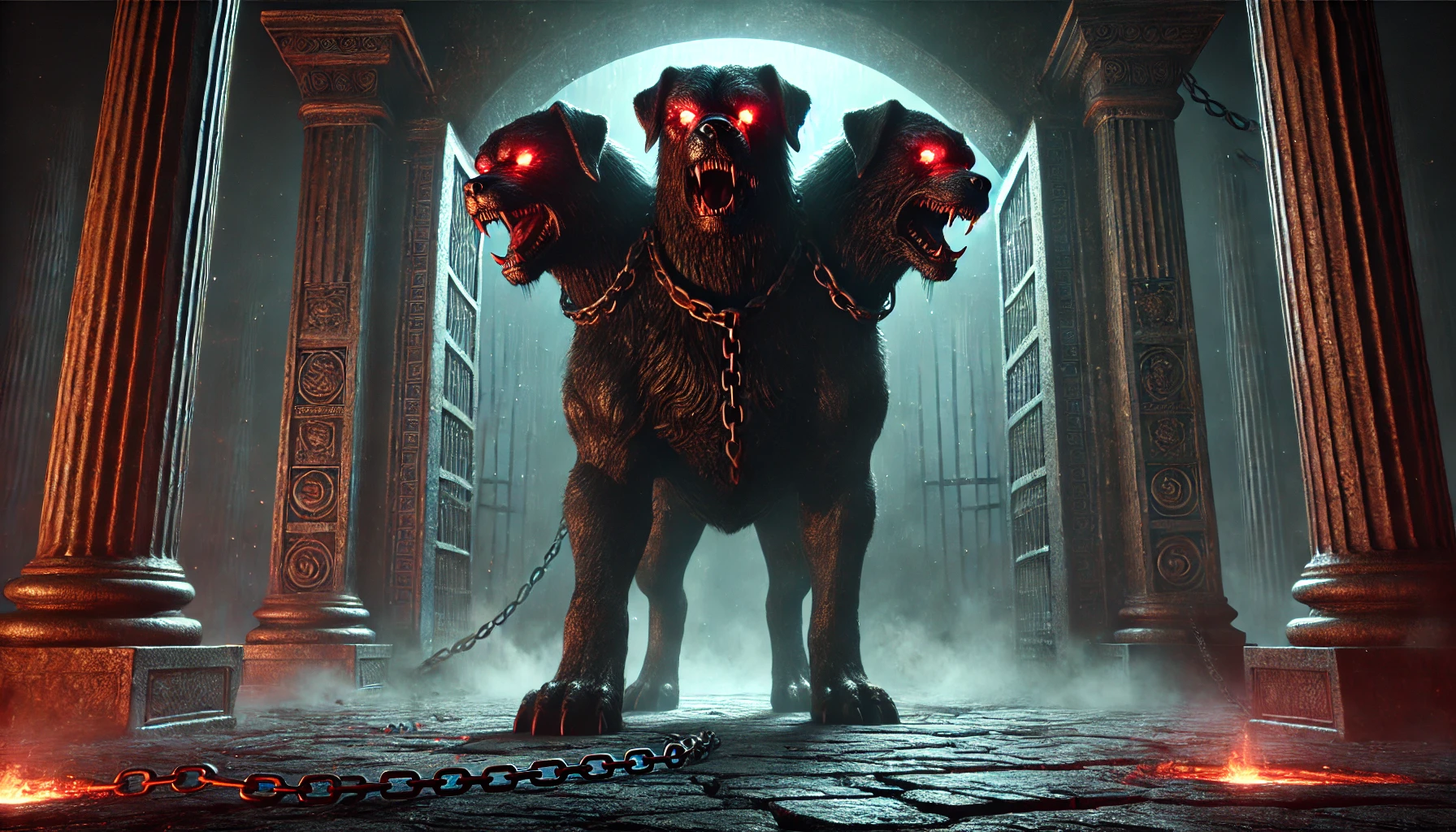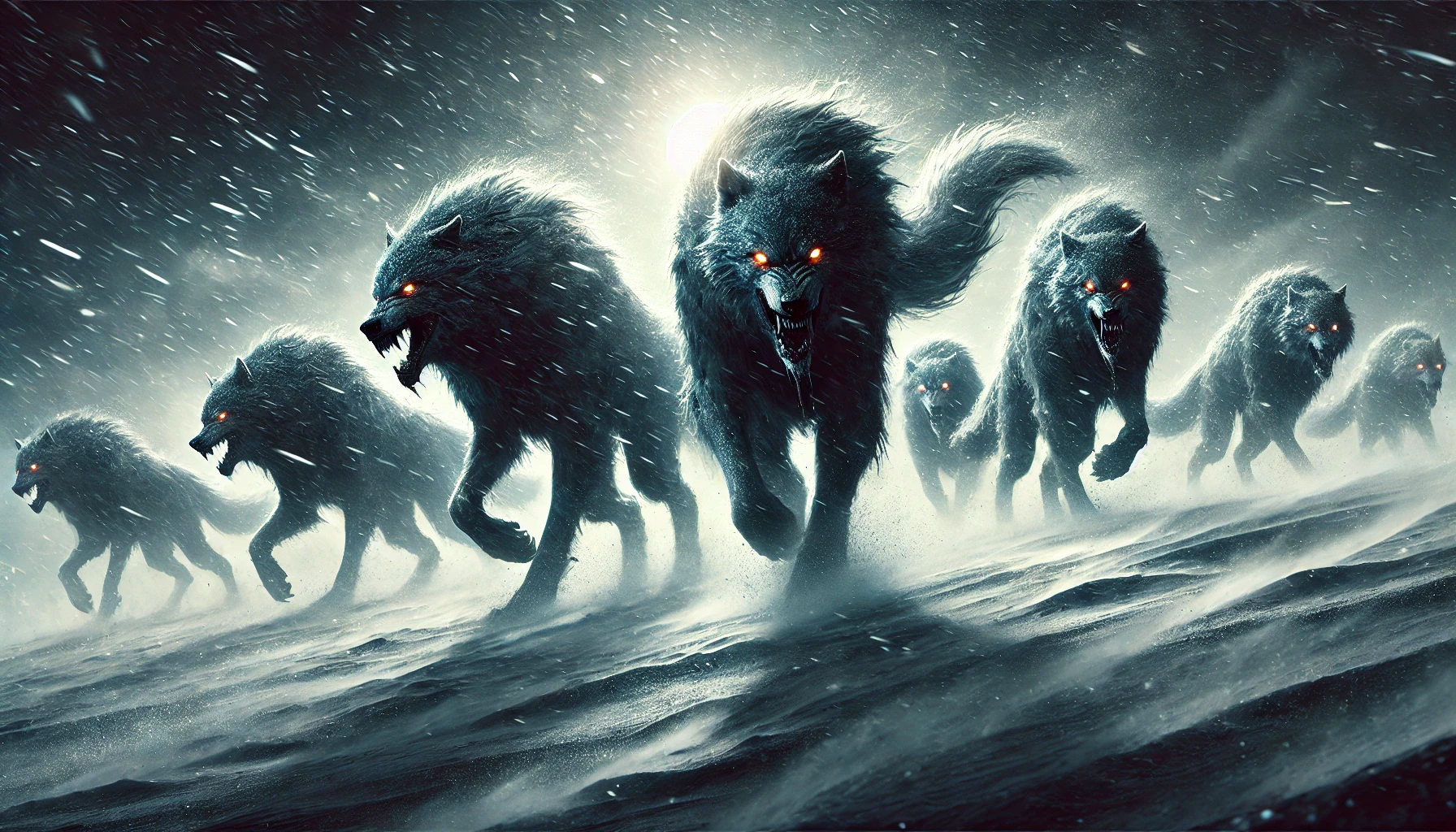The Gates of No Return: Where Cerberus Stands Watch
The River Styx flows cold and silent, its waters darker than the deepest night. On the far shore, beyond the reach of sunlight, stand gates forged from shadow and bone. And guarding those gates is something that makes even the bravest souls hesitate—Cerberus, the three-headed hound of Hades.
His middle head watches the dead as they shuffle past, entering the underworld for eternity. His left head scans the horizon, nostrils flaring for any scent of the living. His right head never stops snarling, a constant reminder that no one leaves without permission. Three pairs of eyes, glowing like coals in the darkness. Three sets of jaws, each capable of tearing a man in half. One purpose: guard the gates, let none escape.
They say if you listen closely at twilight, when the boundary between worlds grows thin, you can hear him—a low, rumbling growl that echoes from somewhere deep beneath the earth.
A Beast of Three Minds: What Cerberus Looks Like
Cerberus is no ordinary hound. His body is massive, larger than any mortal dog, with muscles that ripple beneath fur as black as midnight. Some say his coat shimmers with an oily sheen, as though darkness itself clings to him. His paws leave scorched prints on the stone, and his breath reeks of sulfur and decay.
But it's the three heads that strike terror into all who see him:
- The Left Head: Ever vigilant, scanning for intruders. Its eyes burn with suspicion, and it never sleeps.
- The Middle Head: The oldest and wisest. It speaks rarely, but when it does, even Hades listens.
- The Right Head: The most aggressive, snapping at shadows and howling at the souls who dare look back toward the world of the living.
Each head thinks independently, yet they move as one, an unholy trinity of teeth and fury. And then there's his tail—not the wagging tail of a friendly dog, but a serpent, coiled and ready to strike. Some legends speak of a mane of venomous snakes writhing along his back, hissing in chorus with his growls.
The Hound's Purpose: Keeper of the Dead
Cerberus serves one master: Hades, god of the underworld. His task is simple yet absolute—allow the dead to enter, but prevent them from leaving. Souls may pass through the gates freely, but any who attempt to flee are met with snapping jaws and relentless fury.
But Cerberus's duty extends beyond the dead. He also guards against the living. Mortals who dare descend to the underworld uninvited face his wrath. Heroes have tried to sneak past him, demigods have attempted to fight him, and all have learned the same lesson: Cerberus does not fail.
Yet, despite his fearsome nature, he is not mindless. He is intelligent, calculating, and utterly loyal. He does not kill for sport—he kills because it is his duty. And in the underworld, duty is eternal.
Legends of the Hound: When Heroes Challenged Cerberus
Few have faced Cerberus and lived to tell the tale. Here are the most famous encounters:
Heracles and the Twelfth Labor
The greatest test of Cerberus came when Heracles was tasked with capturing the hound as his final labor. Descending into the underworld, Heracles approached Hades and asked for permission to take Cerberus to the surface—without using weapons. Hades agreed, amused by the audacity.
The battle was legendary. Heracles grappled with all three heads at once, dodging venomous bites from the serpent tail while enduring the crushing strength of the beast. But Heracles's strength was unmatched, and eventually, Cerberus submitted. The hero carried the hound to the surface, where mortals fled in terror at the sight. After completing his labor, Heracles returned Cerberus to his post, and the hound resumed his eternal watch.
Orpheus and the Power of Music
Not all who passed Cerberus used strength. Orpheus, the legendary musician, descended to the underworld to retrieve his beloved Eurydice. When he reached the gates, Cerberus snarled and blocked his path. But Orpheus did not draw a weapon—he drew his lyre.
The music that followed was so beautiful, so mournful, that even Cerberus was moved. His three heads drooped, his eyes softened, and for the first time in eternity, the hound fell asleep. Orpheus passed safely, though his tale would end in tragedy for other reasons. But the lesson was clear: even the fiercest guardian has a weakness.
Where Cerberus Dwells: The Gates of the Underworld
Cerberus does not wander. He is bound to the entrance of Hades, a desolate shore where the River Styx meets the gates of the dead. The landscape is barren—no trees, no grass, only jagged rocks and the faint glow of ghostly light. The air is heavy, suffocating, and the silence is broken only by the distant wails of lost souls.
The gates themselves are said to be carved from obsidian, towering high above even the tallest mortal. And in front of them, pacing back and forth with tireless vigilance, is Cerberus. His domain is small, but his influence is absolute. No one enters or leaves without his knowledge.
The Hound's Powers: Strength, Venom, and Eternal Vigilance
What makes Cerberus so fearsome? His abilities go far beyond those of a normal hound:
- Unmatched Strength: His jaws can crush bone, and his claws can rend armor. Even the strongest warriors struggle to overpower him.
- Venomous Bite: Some legends say his bite carries a toxin that paralyzes the soul, making escape impossible.
- Serpent Tail: The snake tail strikes independently, adding another deadly weapon to his arsenal.
- Three Minds, One Body: Each head thinks and acts independently, making him nearly impossible to outsmart or distract.
- Eternal Wakefulness: Cerberus never tires, never sleeps (unless enchanted), and never forgets his duty.
How to Survive an Encounter with Cerberus
If, by some twist of fate, you find yourself face-to-face with Cerberus, here's what you need to know:
- Do Not Run: He is faster than you. Running only triggers his hunting instinct.
- Offer a Tribute: Ancient Greeks buried their dead with honey cakes, which were said to appease Cerberus. A sweet offering might buy you time.
- Speak with Respect: He understands language and respects those who show courage. Begging or pleading will only anger him.
- Music May Soothe Him: If you possess skill in song or music, it may calm his fury—but only temporarily.
- Never Fight Alone: Even Heracles, the strongest hero in Greek mythology, struggled against him. You stand no chance alone.
Most importantly: do not attempt to leave the underworld once you've entered. That is the one rule Cerberus will never forgive.
The Hound's Loyalty: A Guardian, Not a Monster
Despite his fearsome reputation, Cerberus is not evil. He does not kill for pleasure or hunt for sport. He is a guardian, fulfilling the role assigned to him by Hades. In that sense, he is no different from a loyal dog protecting its home—except his home is the realm of the dead, and his bite is far more permanent.
In some myths, Cerberus is even portrayed sympathetically. He is a creature bound by duty, never able to leave his post, never able to rest. He is as much a prisoner as the souls he guards. And yet, he never wavers. His loyalty to Hades is absolute.
A Final Warning: The Gates Are Always Watched
The underworld is not a place for the living. The dead belong there, and Cerberus ensures they stay. If you find yourself drawn toward the darkness, toward that cold river and those towering gates, turn back. Because once you cross that threshold, once you pass the three-headed hound, there is no return.
Cerberus does not forgive. Cerberus does not forget. And Cerberus never fails.
Some say that on quiet nights, when the moon is hidden and the world grows still, you can hear him from the surface—three voices, howling in unison, a reminder that the gates are always watched, and the guardian never sleeps.



